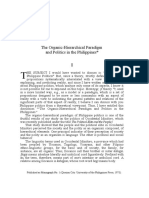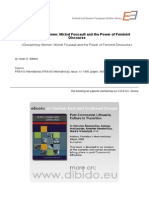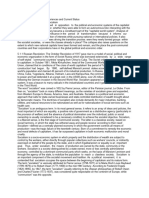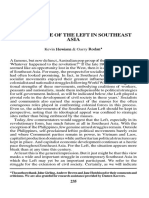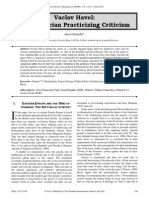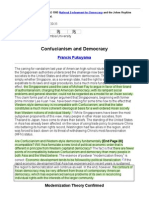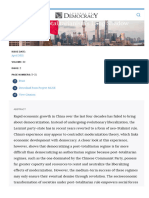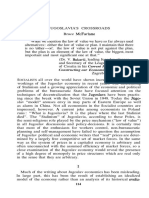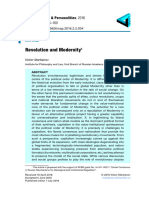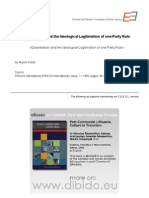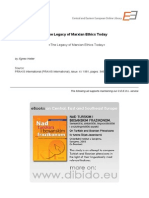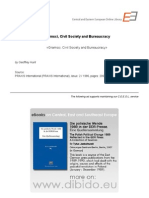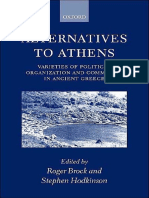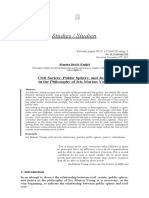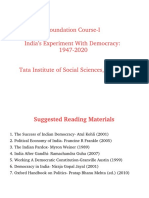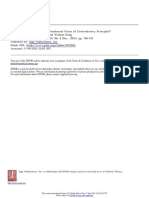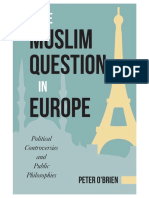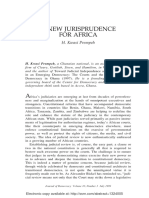2.4 - Markovic, Mihailo - Self-Governing Political System and De-Alienation in Yugoslavia (1950-1965) (En)
2.4 - Markovic, Mihailo - Self-Governing Political System and De-Alienation in Yugoslavia (1950-1965) (En)
Uploaded by
Johann Vessant RoigCopyright:
Available Formats
2.4 - Markovic, Mihailo - Self-Governing Political System and De-Alienation in Yugoslavia (1950-1965) (En)
2.4 - Markovic, Mihailo - Self-Governing Political System and De-Alienation in Yugoslavia (1950-1965) (En)
Uploaded by
Johann Vessant RoigOriginal Description:
Original Title
Copyright
Available Formats
Share this document
Did you find this document useful?
Is this content inappropriate?
Copyright:
Available Formats
2.4 - Markovic, Mihailo - Self-Governing Political System and De-Alienation in Yugoslavia (1950-1965) (En)
2.4 - Markovic, Mihailo - Self-Governing Political System and De-Alienation in Yugoslavia (1950-1965) (En)
Uploaded by
Johann Vessant RoigCopyright:
Available Formats
SelfGoverningPoliticalSystemandDeAlienationinYugoslavia (19501965)
SelfGoverningPoliticalSystemandDeAlienationinYugoslavia(19501965)
byMihailoMarkovi
The following ad supports maintaining our C.E.E.O.L. service
Source: PRAXISInternational(PRAXISInternational),issue:2/1986,pages:159174,onwww.ceeol.com.
SELF-GOVERNING POLITICAL SYSTEM AND DE-ALIENATION IN YUGOSLAVIA (1950-1965)
Mihailo Markovi
In the existing literature, self-government is almost invariably reduced to a form of social organization and decision-making at the micro-level of society: in working organizations and local communities. Alienation is linked with work and is often reduced to alienated labor. Consequently, there is a tendency to see de-alienation as an improvement in the quality of working life. In this paper, self-government will be examined as a macro-concept, as a form of the organization of global society. The emphasis will be on political alienation. De-alienation will be interpreted as political emancipation, or if we wish to maintain a parallel terminology, as an improvement in the quality of citizens life (QCL). 1 There has never been in history a society in which self-government was fully realized both at the micro- and macro-level, in economy, politics and culture. However, each major step in the democratization of a society also means a step in the direction of greater self-government. The very term democracy means government by the people, which coincides with the idea of self-government, i.e., the idea that at each level of social organization people themselves assume full responsibility for governing. Both concepts, democracy and self-government exclude the rule of individual tyrants (autocrats), of oligarchic elites (aristocrats), of professional officials (bureaucrats). In their modern interpretation these concepts do not deny the need for expert knowledge and executive skills. They require a rational measure of decentralization and autonomy of each part of society, but also a necessary amount of coordination among autonomous parts. They combine direct and representative democracy. While all individuals directly take part in decision-making on common issues where they live and work, they delegate a necessary amount of power to coordinate, regulate and direct matters of more general interest. Thus self-government does not differ from traditional government (and fully developed radical democracy from the existing, incomplete forms of parliamentary or congressional democracy) in its acceptance of expertise, representation and central authority. The true difference is denial versus affirmation of professional political leadership that has its root in the existence of political parties intended to rule the country. Self-government is compatible with political pluralism, i.e., existence of political organizations, the function of which is to politically educate, express and mediate particular interests, formulate long-range political programs and
Vol 6 No 2 A Philsophical Journal July 1986 redigitized by Central and Eastern European Online Library - www.ceeol.com
Access via CEEOL NL Germany
160
Praxis International
mobilize mass-support for them. Self-government is not compatible with the existence of hierarchically and oligarchically constituted parties, the function of which is to win and maintain political power. In contrast to any political system in which the basic levers of power remain in the hands of one or the other group of professional political leaders, self-government is characterized by the fact that all its organs at all social levels higher than a workshop or neighbourhood council are composed of delegates who are freely elected for a limited mandate, responsible to their electorate, rotatable, recallable and devoid of any material privileges. To the extent and in the measure in which these conditions have been fulfilled, we may speak about the degree of democratization of a society, i.e., the degree to which it has become a self-governing society. After these introductory theoretical remarks let me examine a special case in which very important steps were made toward self-government as a global political system. The case in question is Yugoslav society in the period 1950-1965. We shall see: 1) under what historical conditions was this process possible; 2) which were the most important institutional changes in the direction of self-management; 3) in what ways did those changes contribute to de-alienation of Yugoslav people; and 4) what general experience can be derived from this case. 2 The formidable obstacle to any democratization is a monopoly of economic and political power. In Yugoslavia, as the consequence of a liberation war (1941-45), both economic power of bourgeoisie in various Yugoslav provinces and the political power of the ruling political parts and of the royal dynasty were destroyed. All pre-requisites for building a self-governing society were there already by 1945. A network of peoples committees covered the entire country; it was possible to develop higher-level organs of that network, anti-fascist councils of peoples liberation, directly into self-governing assemblies. A reversal toward old structures of power was no longer possible. A highly motivated and skilled (but not a professional) army was ready to defend revolutionary achievements. What was missing for development toward self-government was an appropriate political culture. Even the faintest awareness of self-government as a historical alternative was lacking. Prevailing political culture was characterized by a belief in a transition period, in building a workers state, in a strong professional army, in state property and state planning. It was believed that the Soviet Union was truly the first socialist country and that its experience had to be imitated. Only the 1948 conflict with the Soviet Union allowed Yugoslav leadership to search for other alternatives. By that time Kidrich, who was responsible for the economy, kept reporting about growing difficulties of rigid administrative planning, and urging the necessity of looking for some other possibilities. The leadership came to the conclusion that excessive state control over economy and culture led to bureaucratization; and that the bureaucratic drive toward
Vol 6 No 2 A Philsophical Journal July 1986 redigitized by Central and Eastern European Online Library - www.ceeol.com
Praxis International
161
absolute power, nationally and internationally, was the main cause of the Soviet pressure on Yugoslavia during the last five years of Stalins life (1948-53). A new reading of the ideological sources led to the rediscovery of Marxs ideas on associations of producers that regulate production, on organs of public power that have lost political character, on professional politics as a sphere of alienation, on the experiences of the Paris Commune which curbed bureaucratization by making all officials elected, recallable and compensated with workers wages for their work. Alongside the old bolshevik ideology that was never completely uprooted, and which was partially restored after 1972, a new political culture emerged in Yugoslavia in early fifties. Its characteristic features were: a critique of all forms of dogmatic ideology, of statism, of bureaucracy, of professional politics, of any dogmatic, official school of philosophy (dialectical and historical materialism) and of arts (socialist realism); affirmation of the idea of self-government, of economic and cultural pluralism, of greater tolerance toward bourgeois culture, of greater opening toward the world, of non-interference of Communist party into cultural affairs, of radical democratization of ail aspects of public life. Among political conditions which proved decisive for the final outcome of the Yugoslav movement towards self-government, one constituted a major constraint: that the political force that undertook the task of bringing to life self-government was a Party of a Leninist, and to some extent Stalinist character, a Party with a clearly hierarchical and authoritarian structure, that was violently pushed into illegality since 1921, repressed during the entire period 1921-41, decimated by bourgeois nationalist and fascist forces during the Second World War, determined to establish full hegemony after its victory in 1945, committed until 1950 to building a state owned and state planned economy. A favourable circumstance was, however, that with few exceptions, including Tito, the cadres of that party were very young, still in their twenties and early thirties, truly revolutionary, dedicated to great ideals of emancipation, equality and social justice, still able to learn. It is also important that the leadership seemed to believe that self-government was compatible with its lasting power. More than a decade later this belief would turn out to be an illusion. However, enough time was permitted for a crucially important large-scale experiment to develop, to prove its advantages and reveal its problems. 3 Historians of Yugoslav self-management focus on the emergence of workers councils and of a competitive market economy. Much less known are institutional changes in the global political system. A very drastic reduction of the state apparatus took place in the early Fifties. Thousands of state employees were moved into industry, services, education. One has to distinguish carefully between a mere decentralization of alienated state power and its real dismantling and abolition. Both took place under the officially
Vol 6 No 2 A Philsophical Journal July 1986 redigitized by Central and Eastern European Online Library - www.ceeol.com
162
Praxis International
accepted program of de-etatization and of building a self-governing socialism. However, sympathetic observers of Yugoslav development did not notice that a considerable amount of federal state power was simply transferred to the organs of state power in the six national republics and two autonomous provinces. These, in their turn, transferred a considerable part of their power to regional authorities in the commune. (A commune as the basic administrative unit embraces a population of several thousands, usually a town with its agricultural environment.) In the fifties, Kardelj, and some other leaders played with the idea of turning Yugoslavia into a federation of communes. But in the late sixties the national bureaucracies prevailed with their conception of Yugoslavia as a loose federation of national states. The experience of this development shows that self-government must never be confused with, and reduced to, decentralization. The latter is a necessary but not sufficient condition of the former. It is possible to have a decentralized but perfectly statist bureaucratic society. What makes it statist and bureaucratic is the phenomenon of alienated professional political power, i.e., the fact that officials in decentralized institutions are cadres constitutive of a system of nomenclatura, appointed and replaceable by higher-level leaders, determined to stay career politicians, motivated primarily by the pleasures of exercising power and enjoying considerable material privileges. This decentralized statism would be unleashed into a process of cancerous growth later, in the seventies. During the period under consideration, from the 1953 Constitution until the VIII Congress of the League of Communists of Yugoslavia (LCY) in 1964, it was structurally present but dormant, powerless to prevent development of self-governing institutions at all social levels, including that of the federation. In contrast to decentralization of the state, a process of true transcendence (withering away) of the State started in 1950. According to a law that was passed in that year, the state gave up a part of its control over economic enterprises. Workers councils were created in all of them, and, while in the beginning they shared power with the management appointed by the state, within a few years they were given the right to elect and recall the management. Thus workers councils became organs of supreme authority in all working organizations. After industrial enterprises they were introduced in agricultural cooperatives, in services, in educational and cultural institutions. The concept of collective ownership was now profoundly changed. State property turned into social property: working organizations were able to use land, natural resources, buildings and other means of production and they were able to dispose freely the products of their work later they would pay taxes and thus provide for general social needs. However, in principle, it was not possible to alienate (to sell or bequeath) any part of this property. (Individuals and groups later found ways to appropriate considerable parts of social property. This is how the present-day wealth of the Yugoslav nouveaux riches originated during the late sixties and in the seventies.) This was certainly not intended, and is the consequence of a deep moral crisis into which Yugoslavia sank after the disillusionment with the possibility of realization of its self-governing socialism project.
Vol 6 No 2 A Philsophical Journal July 1986 redigitized by Central and Eastern European Online Library - www.ceeol.com
Praxis International
163
The withdrawal of the state from the control of enterprises did not only affect the nature of collective property but also the nature of planning. Yugoslavia had only one rigid, administrative five-year plan: that was the one that covered the period from 1947 to 1951. Already in the early fifties this method of planning was abandoned. Since that time only global proportions of economy were determined. Economic instruments (the policy of investments, taxes, foreign trade, customs constraints) rather than political coercion was used to bring about desirable trends of growth. As we shall see in detail later, Yugoslav economy was in an extremely good shape throughout the period in which this flexible global planning directed the overall development of the country. However a critical and misleading question emerged of the compatibility of planning with self government. As we shall see, it was possible to dissociate entirely planning from the state and make it a function of central self-governing organs. However, those who reduced self-government to micro-level workers councils identified planning with statism, and market competition with self-government. Since this view also expressed economic and political interests of the most developed republics, it eventually prevailed by 1965. With declining authority of federal organs, central planning assumed a merely prognostic function, and any central investment policy tended to vanish: it went into the hands of a large number of newly created local and regional banks. A general impression from the description of Yugoslav development in the fifties and early sixties would be that this massive effort to replace statism with self-government involved the following three different aspects: (1) building self-governing councils at the micro-level of society in working organizations and primary living communities; (2) maintaining statism in a decentralized form in the national republics and autonomous provinces; (3) dismantling some important state functions, especially, overall coordination and global planning. However, there was also a fourth aspect relevant to our theme. Some new self-governing institutions were introduced at the level of global society, partly with the intention to replace the organs of alienated state power, partly alongside with them. The entire sphere of education, culture, scientific research, health and other social services was reorganized in a new self-governing way. In each of these fields a self-governing community was instituted at the regional and republican level with coordinating federal councils. Elected delegates from all working organizations in the field would constitute the assembly of the community. The assembly was responsible for basic policies in the field of education, or culture, etc. It would elect an executive body to deal with daily technical and administrative issues. Such self-governing communities were not financed by the state and through the governments budget but directly from the taxes on personal income of the citizen. In each particular case (of education, scientific research, health service) the law would determine the percentage of the tax that would go to a particular fund for the social service in question. Since personal incomes tended to grow, funding of all those social and cultural activities kept increasing, independently of the state administration. Funds were distributed to particular working organizations according
Vol 6 No 2 A Philsophical Journal July 1986 redigitized by Central and Eastern European Online Library - www.ceeol.com
164
Praxis International
to rules laid down by the assembly of the community. Each working organization had the autonomy to distribute the allocated amount of money according to its own rules. Funds would be allocated considering the number of students, teachers, and costs of special programs taught. The councils of the schools would lay down a statute containing the rules for distribution among individual teachers considering their skills, the number of teaching hours, various special duties, the amount of past work, etc. In such a way teachers, scholars, scientific workers, actors, doctors and other employees in social services did not have the status of state clerks nor were they in any way dependent on governments approval or disapproval which explains the extraordinary freedom of scholarly and artistic creation in Yugoslavia in the period under consideration. Only in the seventies did these self-governing communities start to deteriorate, and in two ways. First, alarmed because of the loss of control over intellectuals, bureaucratic forces changed the structure of self-governing communities. Under the pretext of a need to have also consumers represented (which is in principle a valid point had only the ways been found to send democratically elected representatives of consumers into the assemblies), self-governing communities were filled with loyal members of the Party, not always knowledgeable about science, arts or medicine, but invariably eager to implement the political directives. Second, contrary to the very idea of self-government which presupposes a good deal of voluntary work, a huge number of executives and administrators were employed in those communities. Once bureaucratized they became a heavy financial burden for a not yet fully developed economy. Another important institutional innovation was the creation of a selfdefence organization consisting of the entire adult citizen of the country. It did not replace the professional army, it was introduced alongside with it. Nevertheless, it indicates a practical way to solve one of the most difficult problems of withering away of the state, that of providing security without coercive professional organs of the state. As the experience of the twentieth century guerilla warfare amply demonstrates, a country can enjoy maximum possible security when all its citizens, without being professional soldiers, are ready to defend the independence and basic values of their society. At its VII Congress in 1958, the Yugoslav Communist Party decided to transform itself into an essentially educational political organization with a new name League of Communists of Yugoslavia. The basic change was that LCY would no longer be a ruling party, would no longer take basic political decisions and impose them on the organs of self-management. This was an important decision, independently of how seriously it was interpreted by all leaders. It is possible, even quite likely, that some cadres understood it as only a temporary tactical measure, that it was essentially harmless because there was no other party to seize the levers of power. Some leaders probably believed that their reputation was so enormous, that a degree of emancipation would not practically challenge their charismatic authority. Most Yugoslav communists, especially intellectuals took the change seriously, as another proof that Yugoslav society really approached self-
Vol 6 No 2 A Philsophical Journal July 1986 redigitized by Central and Eastern European Online Library - www.ceeol.com
Praxis International
165
governing socialism. And indeed the main rationale for the decision was the incompatibility of the existence of a ruling party and a political system based on the principle of self-government. If the elected delegates in self-governing assemblies are to really become responsible for the policies of the country then they cannot receive specific orders from the political party to which they belong which does not exclude that they make choices among existing political alternatives guided by values and long-range goals of the political organization to which they belong. But in the latter case the function of the political organization is to generate a political culture, to raise political consciousness of people, to formulate criteria of choice, not to choose itself, not to decide, not to rule. This was an essential step toward the solution of the very difficult problem of the relation between self-governing assemblies and political parties. In contrast to a parliament, a self-governing assembly does not have room for ruling and oppositionary parties. Its members do not represent interests of political parties but directly those of citizens, federal units, and various branches of labor. They are responsible to their electorate not to a political organization to which they may belong. Under those conditions political organizations cease to be parties, since the basic function of the latter is to win and maintain political power. Political pluralism in two senses now becomes possible. First, members of the same organization elected into a self-governing assembly may interpret in different ways the programmatic ends of their organization, they may argue among themselves and make different choices. Pluralism in this sense has been present in the League of Communists of Yugoslavia since 1958. Second, it should be, in principle, possible for citizens and members of self-governing bodies to choose among several non-party organizations. Pluralism of this kind has never been tolerated in Yugoslavia. Therefore, after fourteen years of a very low-key presence of the League of Communists in the political system, it was possible to go back to one-party rule in 1972 and to even include the Party for the first time into the formal structure of the state system. (According to 1974 Constitution, federal and republican assemblies are composed of three chambers. One of them is the chamber of delegates of socio-political organizations, which are all under the umbrella of CLY.) The experience of those early years after the adoption of the 1958 Program of the CLY was remarkable. In all political bodies, from the communal to the federal assembly, true debates began to take place, different interests were more freely expressed, issues began to be decided through struggle of different opinions, through negotiation and trade off. Another important feature of the 1958 Program of LCY was that it declared that it was the duty of each member to fight against bureaucratism and professional politics. The essential goal of LCY, in that period, was explicitly stated as the transformation of all organs of the State into organs of self-government. The full meaning of this truly radical slogan was not spelled out in official documents. But the implicit basic tendency was brought to life in the political practice in the period 1958-1963. An increasing number of political professionals were replaced by activists employed in non-political professions,
Vol 6 No 2 A Philsophical Journal July 1986 redigitized by Central and Eastern European Online Library - www.ceeol.com
166
Praxis International
elected to serve in political functions for limited intervals of time. An Important change of the structure of republican and federal assemblies took place. Alongside two chambers composed of professional political cadres, three new self-governing chambers were introduced: one for economic policies, one for social services, and one for education and culture. Their members were elected delegates of enterprises, hospitals, universities and cultural and scientific institutions. They did not enjoy any bureaucratic privileges like the cadres, only a modest compensation for work in the assembly when they had to be absent from their professional work. By 1963 it was quite clear which crucial and indeed strategic step had to be made in order to transform federal and republican assemblies into truly self-governing bodies and to achieve historical victory over bureaucratic forces. It was necessary to turn the remaining two chambers into selfgoverning bodies. In practical terms this meant that members of those two chambers, nearly three hundred professional political cadres, had to undergo truly free election competing with other candidates, and that the elected ones would have to give up lavish material privileges and be subject to the same rules as all other non-professional members of the assembly. Such democratically constituted assemblies would enjoy moral and political authority in order to assume leadership over basic policies of global Yugoslav society. At that turning point the Socialist League of Working People (a mass political organization under the control of LCY that embraces trade unions, the league of youth and all other political organizations) formulated the platform for the coming general elections in very liberal terms: It was possible to have a plurality of candidates for each position, and the electorate was invited to propose candidates in addition to the official list of candidates supported by the Socialist League of Working People. The process of nomination of candidates took place, and it demonstrated extraordinary political maturity of Yugoslav population. The vast majority of candidates nominated by the people were socialists who either played important roles in the National Liberation War or excelled in their post-war activities. Thus there was no reason to fear that in Yugoslavia in 1963 free elections would undermine existing socialist institutions. However, there were excellent reasons to fear that such free elections would destroy the entire still existing system of nomenclatura. In spite of this massive, spectacular drive toward self-government the basic network of leading professional cadres survived almost intact. It kept low profile, resembling a quiet watch-dog that temporarily was satisfied to observe silently the course of events, primarily concerned that things do not get out of hand and beyond certain preestablished limits. However in the crucial years, 1963-65, the top leadership obviously judged that the demands for free elections went too far. Activists elected by the will of the people and not by the will of a higher-level leadership need not be as obedient and subservient as professional cadres, whose career and well-being totally depend on their political bosses. The bosses who are no longer needed to support and materially provide their proteges, and who therefore can no
Vol 6 No 2 A Philsophical Journal July 1986 redigitized by Central and Eastern European Online Library - www.ceeol.com
Praxts International
167
longer count on personal loyalty and absolute subordination, stop being bosses. The entire nomenclatura system crumbles. Thus, the leadership, which decided to continue to cling to power, knew that it was necessary to block free elections and the entire democratization process. To this purpose a highly complex operation was undertaken, offering an entirely different social contract with the people. The basic relatively attractive elements of the new social contract were: strong emphasis on particular national interests, market competition, a call to the able ones to get rich, the so called opening to the world (which meant taking loans from Western banks, free flow of imported goods, indiscriminate consumption, free travel and work in the capitalist West). This new social contract divided the working class, quickly generated a new middle class, produced a deep economic and moral crisis, dealt an almost mortal blow to the project of integral self-government but it saved the system of nomenclatura and restored political bureaucracy. (The details of this transformation after 1965 have to be told on another occasion in another text.) For my present purpose, it suffices to see what were the emancipatory consequences of the development until 1965, and what in general can be learnt from this experience. 4 There is a vast evidence to support the thesis that an impressive process of political, economic and cultural de-alienation took place in Yugoslavia between 1950 and 1965. This de-alienation was a direct consequence of a gradual, ongoing democratization throughout this period. All citizens acquired the right to participate in decision-making, both in their working organizations and living communities. Farmers, compelled to join agricultural cooperatives in 1948, were allowed by 1952 to take their land back, to produce freely and sell their products on the market, to buy machinery, fertilizers and hybrid seed without any political or economic conditions. Intellectuals were able to increasingly freely express themselves and to control cultural institutions in which they were employed. The 1958 Program of the LCY stated explicitly that the Party could not be the judge in matters of scholarship and arts, and that truth of ideas could only be established in a free struggle of opinions and viewpoints. As a consequence, a plurality of schools of thoughts and trends in arts flourished in Yugoslavia in the late fifties and early sxities. A spirit of remarkable tolerance toward Western culture prevailed. A number of critical journals were published or started at the time (Pogledi, Gledita, Filozofija, Praxis). A strong anti-dogmatic spirit dominated in such a way that all pillars of borrowed Stalinist culture were smashed within years: dialectical materialism in philosophy, historical materialism in social sciences, socialist realism in arts. The mass media were never fully liberated from bureaucratic control, and yet they had periods of remarkable freedom of critical thought. The overall impression of the majority of Yugoslav people by 1962-63 was that inspite of economic scarcities, bureaucratic privileges and occasional outbursts of leaders arrogance the
Vol 6 No 2 A Philsophical Journal July 1986 redigitized by Central and Eastern European Online Library - www.ceeol.com
168
Praxis International
country was moving in a right direction toward greater freedom, social justice and prosperity. In any attempt to estimate the consequences of these changes from the point of view of the conceptual continuum alienation de-alienation, one has to take into account enormous vacillations in Yugoslav history within two decades the forties and the fifties. On the eve of the Second World War, Yugoslav society was highly oppressive and corrupt. It disintegrated under the Nazi attack in April 1941. Then it mobilized enormous forces for resistance, national liberation and building a freer, more harmonious and just political and economic order. These ends were achieved owing to a tremendous amount of de-alienated, meaningful, free, morally highly motivated and creative activity. The period 1945-50 must have been experienced by most people with mixed feelings. The replica of the Soviet system, established immediately after the war, was very different from the expectations much more authoritarian, centralistic, much less egalitarian, democratic and just. Subjectively, most people did not feel alienated, they rationalized the unexpected situation trying to believe that a transition period was necessary to overcome war destruction, to defend from enemies and mobilize all forces for building the new society that would emerge some time in the future. However, all dimensions of objective alienation were present. People had no control over their own products, no influence on political decisions, they were turned into objects of massive Ideological education. In spite of all glorification of work, it was entirely evaluated in quantitative terms and because of the scarcity of any advanced technology it was even more mechanical than in pre-war times. Especially peasants received unexpectedly bad treatment: high quotas of delivery of their products were assigned to them; they were increasingly politically underrepresented; and, in 1948, they were compelled to join working cooperatives. In spite of all this for many Yugoslavs life had meaning in terms of great social projects; the self had to be subordinated to the collective. Not all individuals experienced that as self-alienation but objectively this dissolution of individuality in the collective is one of its dimensions. The changes after 1950 did not nearly eliminate all those forms of alienation. Yet, there can hardly be any doubt that they were progressively and substantially diminished during the period 1950-1965. Members of workers councils were democratically elected, and they had some real power in electing managers, in deciding what and how to produce, to whom and at what price to sell, how to distribute the revenue, how to use the surpluses, whether to approve the work of managers or to recall them, what rules to lay down in order to regulate life in their working organizations. Similarly, university teachers autonomously decided what curricula to teach, what criteria to apply for admission and grading students, for election and promotion of professors, whom to elect for the dean and rector, and how to distribute funds received from the self-governing community for education. All this contributed to a sense of autonomy, of independence from state bureaucracy, of power in that cell of society in which they happened to work.
Vol 6 No 2 A Philsophical Journal July 1986 redigitized by Central and Eastern European Online Library - www.ceeol.com
Praxis International
169
In that period there was certainly an increase of initiative, of interest in public issues, of readiness to take an active role in community affairs. One of the objective indicators of higher motivation for work was an accelerated material development of Yugoslav society. Throughout the period 1952-1963 the growth rate of Yugoslav economy exceeded 10%; it was second only to Japan. It is true that the growth rates are higher in initial phases of development, and that a moderate amount of Western aid was of great help in the fifties. The fact is, however, that during the given period, Yugoslavia did much better than any other country at the comparable level of development, and that It did much better at that time than later when it took incomparable higher loans from the West. The only explanation is higher motivation, better working morale of Yugoslav workers, who at that time were ready to invest hard work for the future of their country. In contrast to the period of statism (1945-50) there was a switch from ascetic subordination of the individual to society toward greater emphasis on personal self-fulfillment. Before the pendulum shifted to the opposite extreme of a hedonist consumerist culture (after 1965) it moved within an area of a certain balance between the satisfaction of collective and individual interests. Consumer goods were produced in greater quantities than during the preceeding period; compulsory allocation of labor by the state organs was replaced by free choice of profession and place of work; rigid discipline was relaxed; all rules became more flexible and diversified; renumeration according to work achievement allowed Individuals with greater abilities to achieve a higher level of personal self-realization. Greater freedom of travel and self-expression, greater tolerance for unusual, even deviant views and life styles contributed greatly to this. All this took place within the limits of an essentially modest life in material terms. Only with the introduction of a laissez faire market economy which was an essential element of the 1965 economic reform did Yugoslavia drift toward an individualistic, consumerist society. Another essential objective dimension of the alienation-dealienation continuum concerns the quality of the relationships between human individuals and groups. A full story can hardly be told here. Yugoslavia was a society in flux, with almost twenty million inhabitants and a variety of national and religious groups. Yugoslav ethnic and religious conflicts are well known, and a long time was needed to heal the deep wounds of a civil war. Out of one million seven hundred thousand Yugoslavs who perished during the Second World War certainly more than a half perished from brotherly hands. And yet the period in question was one of remarkable stability, and of national and religious peace. Churches (Catholic, Orthodox, Muslim) settled their relations with the State and did not clash with each other. Federal arrangement, with a considerable autonomy of each national republic and province, seemed to more or less satisfy all national interests. (As it became known later, some national conflicts erupted behind the closed doors among national bureaucratic elites.) Later in the seventies, when a process of dismantling the national federation gave those elites unlimited power in the republics and brought about eight national economies, Yugoslavia was forced
Vol 6 No 2 A Philsophical Journal July 1986 redigitized by Central and Eastern European Online Library - www.ceeol.com
170
Praxis International
to face its national question again, this time without any real supranational authority to solve it.) Speaking again in relative terms, in comparison with earlier and later times, human relations were at a higher moral level during the period under consideration. There was definitely more solidarity and mutuality, more aid to the week, old, sick; greater social care of the children, no unemployment, more care and sacrifice for other human beings. These were the features of a collectivist morality developed at the mass-scale during the partisan war. It was drowned in the icy water of bourgeois egoism during the process of restoration of competitive economy after 1965. There is a striking regularity in comparing data about phenomena that indicate subjective alienation: alcoholism, use of drugs, the rate of suicides, the statistics of broken homes and abandoned children, juvenile criminality, unsafety on the streets, prostitution, rape, sabotage, absenteeism in work, mental and psychosomatic illnesses. All these rates dropped during the period under consideration, but have steadily risen until the present. 5 The concept of the quality of citizen life was introduced at the beginning. That quality was never too high; democratic traditions in the political life of the various regions of Yugoslavia are rather scant. In addition, a one-party system imposes rigid limits when it comes to political liberties. And yet there is no doubt that the quality of citizen life was improved during this incomplete process of implementation of self-government in the global political system. Since Yugoslav self-government reached a higher level in the economy than in politics, socio-economic rights of Yugoslav citizens were better established and defended than civil rights. They embraced the right to a job, to full social security (paid sick leave, free health service, guaranteed retirement, supplements for each child), the right to a free education from the elementary school to the university, the right to an apartment from ones working organization. As to civil rights, a Yugoslav citizen by 1950 did not have the right to publish a text that did not pass censorship, to publish abroad what was not previously published within the country, to organize politically outside the Peoples Front, to demonstrate without the permission of the Secretariat of the Interiors, to travel abroad without the visa issued by the Security organs, to stay abroad more time than permitted, to keep any foreign currency, to send critical letters and collective petitions to the authorities, to both occupy a public position and belong to a church. Still worse, a citizen could have been arrested and kept an indefinite time under investigation without seeing his lawyer or even being brought to the court. Some of civil rights were not and have not been fully implemented until this very day. Some critical texts cannot be published, or if printed cannot be distributed. No organizations of citizens are permitted unless they are controlled by the Socialist League of Working People. Street demonstrations are tolerated only if they are officially organized. Some citizens can be refused a passport without any explanation in the interest of national security and
Vol 6 No 2 A Philsophical Journal July 1986 redigitized by Central and Eastern European Online Library - www.ceeol.com
Praxis International
171
defense. Verbal crimes (dlits dopinion) can still be prosecuted on the basis of a vague article of penal code that classifies as a crime alleged hostile propaganda (defined as untrue and malicious description of Yugoslav society). In spite of all this, a process of significant political liberalization took place in Yugoslavia after the break with the Soviet camp. Censorship for mass-media and publishing houses was abolished. Publishing abroad is tolerated. Once approved and part of the Socialist League, a cultural organization can achieve a remarkable degree of autonomy (for example, Serbian and Croatian philosophical and sociological societies, Writers union of Serbia). With few exceptions, Yugoslavs are now free to travel abroad. They get a passport for five years and do not need any visa. They can bring home and keep in their bank account any amount of foreign currencies. They are free to stay abroad any amount of time without risking their citizens status. They may send any critical petition to the authorities and according to the Constitution have the right to get a reply (which in practice hardly ever arrives). The length of time that the security organs have the right to keep an arrested citizen without allowing him to see his lawyer and the judge was reduced to a mere 24 hours and only recently increased to 72 hours. The described quality of citizens life is still far from the ideal. From the point of view of socio-ecomonic rights it is even superior to some Western democracies. From the point of view of civil rights, it is still inferior to Western democracies but far superior to societies of real socialism. The general conclusion from preceeding consideration need not be a strong assertion about a casual link between self-government and de-alienation. There are several other factors that have to be taken into account: the quality of cultural traditions; the degree of industrialization; national, racial or religious domination; the influences of geo-political position and social environment, etc. It is, however, reasonable to conclude that there is a positive correlation between the introduction of self-government and dealienation. More specifically: a partial transformation of a traditional state into a self-governing political system enhances the quality of citizens life and the degree of realization of human rights. 6 The following general lessons can be derived from the Yugoslav experience in the period (1950-1965). First, even a limited initial structure of self-government has a number of beneficial results. It enhances the quality of both working and citizen life; brings about a sense of identification of individual with particular community and global society; generates a higher motivation for public engagement which leads to an accelerated material development and to a favourable climate for cultural creativity. Second, even a limited introduction of self-governing forms into political system indicates some advantages that a fully developed integral selfgovernment could have over traditional representative forms of political
Vol 6 No 2 A Philsophical Journal July 1986 redigitized by Central and Eastern European Online Library - www.ceeol.com
172
Praxis International
democracy. Unless representative democracy is combined with direct, participatory democracy, the political system is excessively centralistic and burdened with a large bureaucratic apparatus. As a consequence the political decision-making is slow, costly and abstract, because it takes place at a considerable distance from the relevant area. A reasonable measure of decentralization is a necessary (although not a sufficient) condition of a more specific concrete, prompt and efficient decision-making. As we have seen, a reasonable degree of decentralization is an essential feature of selfgovernment. However, present-day Yugoslavia is a living proof of a decentralized regional bureaucratism, which on the whole finds itself below the level of modern liberal civilization. Therefore the problem of bureaucratic state cannot be solved merely by a process of decentralization. It requires a transcendence of alienated politics. The latter can mean only the abolition not only of the entire system of nomenclatura but also of any form of political bossism. Political functions must be a matter of civil pride and honor; not a theater for the exercise of personal power. This presupposes a different kind of political pluralism than the one known in Western democracies: pluralism of ideas, values, programs, movements, non-hierarchical, non-ideological organizations not pluralism of oligarchical political parties, the leaders of which strive for personal power. It is of course true that a limited self-government may in some respects be inferior to traditional representative democracy. That is just because it is a limited initial form which does not grow on the basis of an already existing fully developed bourgeois democracy, but is introduced from above by a typical authoritarian political party. It is of course paradoxical that Yugoslavia had the freest universities in the world at the same time that its citizens did not even have the right to vote for members of their assembly. In general, such paradoxes demonstrate that history produces hybrids rather than perfect realizations of conceptual projects. More specifically, with respect to our theme, this demonstrates how even limited self-government, in spite of all its constraints, indicates the road for further development of old democracies. Third, the lesson of Yugoslav experience is that it is extremely difficult, if not impossible, to move from an already established statism to a fully developed self-government. Yugoslavia had a real chance while its progressive forces constituted a movement, before they got frozen into another state order. It was necessary to find a way to resolve creatively the contradiction between an authoritarian Leninist vanguard party, which aspired to complete hegemony, and a broad democratic character of the movement constituted by peoples committees and peoples liberation army. The Yugoslav revolution kept moving toward the resolution of that contradiction during the period under consideration, but eventually failed to overcome its own inner barriers and sank into a deep lasting crisis. Fourth, at the point reached in Yugoslavia by 1963-1965 it was possible to grasp concrete possibilities of further development, possibilities that would stand a much better chance of realization in materially and culturally more developed societies. What council-democracy means in concrete terms, how
Vol 6 No 2 A Philsophical Journal July 1986 redigitized by Central and Eastern European Online Library - www.ceeol.com
Praxis International
173
the project of transcendence of the state could be interpreted is much clearer after the Yugoslav experience, and with concepts used in Yugoslav theory, properly reinterpreted. One can see now how direct democracy can be combined with representative democracy. All individuals take directly part in decision-making on specific issues will be handled in the self-governing assembly of an appropriate higher level. Individuals of competence, integrity and practical wisdom would be elected and the necessary authority would be delegated to them to deal with such common issues. Of course, it is essential that elections are free and not manipulated by a ruling party. Assemblies can consist of several chambers, considering different kinds of Interests to be represented and different areas of problems that require coordination and direction. Particular interests of different economic branches can be represented in a chamber of associated labour that would deal with the entire area of production of goods and services. Particular interests of different provinces (national republics in a federally arranged multi-national country) can be represented In a chamber of federal units which would take care of equality of conditions for development of each part of a federation. General interests of all citizens can be expressed and defended in a chamber composed of directly elected representatives of people. Today it is possible to substitute a complex, highly articulated theory for Utopian phrases about associations of producers, withering away of the state and organs of public power which do not have political character. We understand much better the limitations of both centralism and decentralization, but also both the advantages and pitfalls of federalism. It is clearer how there can be political pluralism without political parties, how democratic planning is compatible with the market of commodities, and how there can be a strong organization of self-defense without being a professional army. Last but not least, one is now In the position to give a detailed answer to the critical question: How is efficient management by non-professionals possible in modern society which requires high level of expertize in all decision-making? The crux of the answer is to be found in the distinction between analytical, political and technical phases of decision-making process. A self-governing organ can organize its own analytical service that supplies it with information and critical judgement independently of the technical management. To be sure it can hire services of existing scientific institutes. In important cases it can compare analysis from two or more different sources. In relation to technical experts from the operative management, a well informed self-governing organ can request alternative technical solutions accompanied by a cost-benefit analysis for each alternative. Of course, expert knowledge does not qualify anyone for leadership. It need not be followed by any general cultural, wise, rational approach to issues outside the scope of specialized knowledge, let alone understanding of general needs of the community of moral demands and reasonable political goals. It is in the nature of instrumental rationality, that characterizes technical experts, that it is not concerned with the determination of ends but solely with the discovery of the most adequate means. Thus technical expertize is quite compatible with
Vol 6 No 2 A Philsophical Journal July 1986 redigitized by Central and Eastern European Online Library - www.ceeol.com
174
Praxis International
political leadership provided by the organs of self-government. The point is that the former must always be subordinate to the latter. The only innovation introduced by self-government in this respect is that here political leadership is not alienated from the people, as it is more or less the case in all other known forms of political organization. Thus, what was supposed to be the most important conservative argument against self-government falls entirely on its head. Experts cannot rule precisely because they are experts. Far from being incompatible with self-government, modernity requires it in order to complete its project of human emancipation. Whether this project will ever be completed remains uncertain, and the Yugoslav experience only proves that uncertainty. Without strong collective will to freedom, self-government cannot be brought to life. But the collective will to freedom is not mechanically determined and cannot be predicted.
Vol 6 No 2 A Philsophical Journal July 1986 redigitized by Central and Eastern European Online Library - www.ceeol.com
You might also like
- Western Constitutionalism - Andrea BurattiDocument257 pagesWestern Constitutionalism - Andrea BurattiGulrukh SadullayevaNoch keine Bewertungen
- 4.5 - Riot-Sarcey, Michèle & Varikas, Eleni - Feminist Consciousness in The Nineteenth Century. A Pariah Consciousness¿ (EN)Document24 pages4.5 - Riot-Sarcey, Michèle & Varikas, Eleni - Feminist Consciousness in The Nineteenth Century. A Pariah Consciousness¿ (EN)Johann Vessant RoigNoch keine Bewertungen
- 4.5 - Riot-Sarcey, Michèle & Varikas, Eleni - Feminist Consciousness in The Nineteenth Century. A Pariah Consciousness¿ (EN)Document24 pages4.5 - Riot-Sarcey, Michèle & Varikas, Eleni - Feminist Consciousness in The Nineteenth Century. A Pariah Consciousness¿ (EN)Johann Vessant RoigNoch keine Bewertungen
- Agpalo - Organic - Hierarchical - Paradigm and Politics PDFDocument27 pagesAgpalo - Organic - Hierarchical - Paradigm and Politics PDFRod EllaineNoch keine Bewertungen
- Culling The Masses The Democratic Origins of Racist Immigration Policy in The AmericasDocument512 pagesCulling The Masses The Democratic Origins of Racist Immigration Policy in The Americasaejandro16Noch keine Bewertungen
- Conscripts of Western CivilizationDocument10 pagesConscripts of Western CivilizationtoufoulNoch keine Bewertungen
- 4.6 - Balbus, Isaac D. - Disciplining Women. Michel Foucault and The Power of Feminist Discourse (En)Document19 pages4.6 - Balbus, Isaac D. - Disciplining Women. Michel Foucault and The Power of Feminist Discourse (En)Johann Vessant RoigNoch keine Bewertungen
- 4.3 - Fraser, Nancy - Toward A Discourse of Ethic Theory (En)Document6 pages4.3 - Fraser, Nancy - Toward A Discourse of Ethic Theory (En)Johann Vessant RoigNoch keine Bewertungen
- 2.1 - Márkus, György - The Hegelian Concept of Culture (EN)Document12 pages2.1 - Márkus, György - The Hegelian Concept of Culture (EN)Johann Vessant RoigNoch keine Bewertungen
- 3.3 - Schürmann, Reiner - On Constituting Oneself An Anarchistic Subject (EN)Document18 pages3.3 - Schürmann, Reiner - On Constituting Oneself An Anarchistic Subject (EN)Johann Vessant RoigNoch keine Bewertungen
- Senior PPG Q1-M2 For PrintingDocument22 pagesSenior PPG Q1-M2 For PrintingChapz Pacz100% (2)
- Yugoslavia's Self-Management: Daniel JakopovichDocument7 pagesYugoslavia's Self-Management: Daniel JakopovichJose BarreraNoch keine Bewertungen
- Labor Zionism, The State, and Beyond - An Interpretation of Changing Realities and Changing HistoriesDocument28 pagesLabor Zionism, The State, and Beyond - An Interpretation of Changing Realities and Changing HistoriesOrso RaggianteNoch keine Bewertungen
- Frič - Political Developments After 1989Document17 pagesFrič - Political Developments After 1989Pavol FričNoch keine Bewertungen
- SocialismDocument11 pagesSocialismkhushitibrewal747Noch keine Bewertungen
- The USSR - The Thwarted TransitionDocument10 pagesThe USSR - The Thwarted Transitionjpasco_7Noch keine Bewertungen
- 1.2 - Arato, Andrew - Thinking The Present. Revolution in Eastern Europe. Revolution, Civil Society and Democracy (En)Document16 pages1.2 - Arato, Andrew - Thinking The Present. Revolution in Eastern Europe. Revolution, Civil Society and Democracy (En)Johann Vessant RoigNoch keine Bewertungen
- Okila Kosimbekova. Final Essay. PoliticsDocument7 pagesOkila Kosimbekova. Final Essay. PoliticsRiley ButlerNoch keine Bewertungen
- Hewson & Rodan, The Decline of The Left (Socialist Register, 1994)Document28 pagesHewson & Rodan, The Decline of The Left (Socialist Register, 1994)Hassan as-SabbaghNoch keine Bewertungen
- HTTP Rccsar Revues Org 95Document18 pagesHTTP Rccsar Revues Org 95SurangaWeerasooriyaNoch keine Bewertungen
- Rocamora 2004Document26 pagesRocamora 2004Aaliyah DumangasNoch keine Bewertungen
- Vaclav Havel: The Politician Practicizing CriticismDocument9 pagesVaclav Havel: The Politician Practicizing CriticismthesijNoch keine Bewertungen
- The Post-Socialist Growth Machine: The Case of Hungary: Laszlo J Kulcsar and Tamas DomokosDocument14 pagesThe Post-Socialist Growth Machine: The Case of Hungary: Laszlo J Kulcsar and Tamas DomokosDaria SeusanNoch keine Bewertungen
- Confucianism and DemocracyDocument12 pagesConfucianism and DemocracyrosindustedNoch keine Bewertungen
- Shaping A New Politics in Poland: Interests & Politics in Post-Communist East Europe (PCEE 8, 1991) David Ost.Document44 pagesShaping A New Politics in Poland: Interests & Politics in Post-Communist East Europe (PCEE 8, 1991) David Ost.Minda de Gunzburg Center for European Studies at Harvard UniversityNoch keine Bewertungen
- The Tribe of Moles Sergio Bologna (1977) The Tribe of MolesDocument28 pagesThe Tribe of Moles Sergio Bologna (1977) The Tribe of MolesKuba SzrederNoch keine Bewertungen
- Barry Finger, On Bureaucratic Collectivism (1997)Document43 pagesBarry Finger, On Bureaucratic Collectivism (1997)Scott McLemeeNoch keine Bewertungen
- Reform Communism and Neo-Marxism in West Bengal: A Theoretical-Explorative DesignDocument10 pagesReform Communism and Neo-Marxism in West Bengal: A Theoretical-Explorative DesignInternational Organization of Scientific Research (IOSR)Noch keine Bewertungen
- 10-2papadopoulos - Radical Left PosthumanismDocument18 pages10-2papadopoulos - Radical Left PosthumanismLeaEstCivisMundiNoch keine Bewertungen
- Advanced Capitalist SocietyDocument11 pagesAdvanced Capitalist SocietyKeshor YambemNoch keine Bewertungen
- Deutscher's Capitulation To Stalinism (1963)Document32 pagesDeutscher's Capitulation To Stalinism (1963)antoniojoseespNoch keine Bewertungen
- 12 AugustPSIRSectional Test 5 April BatchModel Answer - 1692554885 1Document10 pages12 AugustPSIRSectional Test 5 April BatchModel Answer - 1692554885 1Flying queriesNoch keine Bewertungen
- Chantal Mouffe & Ernesto Laclau - Sosialist Strategy, Where NextDocument6 pagesChantal Mouffe & Ernesto Laclau - Sosialist Strategy, Where NextGiorgosNoch keine Bewertungen
- Pts 144Document10 pagesPts 144Kim EcarmaNoch keine Bewertungen
- Adam Social DemocracyDocument32 pagesAdam Social DemocracyNerd ReinaNoch keine Bewertungen
- The Ideology of StateDocument4 pagesThe Ideology of StaterandhirNoch keine Bewertungen
- Ssia - Nikolaos.nikolakakis LibreDocument9 pagesSsia - Nikolaos.nikolakakis LibreJames GohNoch keine Bewertungen
- Adam Przeworski - Social Democracy As A Historical PhenomenonDocument32 pagesAdam Przeworski - Social Democracy As A Historical PhenomenonLukas Kudic-GlosterNoch keine Bewertungen
- "How Parliament Can Play A Revolutionary Part in The Transition To Socialism and The Role of The Popular Masses by Jan KozakDocument3 pages"How Parliament Can Play A Revolutionary Part in The Transition To Socialism and The Role of The Popular Masses by Jan KozakJ.M.G.Noch keine Bewertungen
- China Totalitarianism's Long ShadowDocument30 pagesChina Totalitarianism's Long ShadowpaintoisandraNoch keine Bewertungen
- Historical Development PDFDocument36 pagesHistorical Development PDFsangeetaNoch keine Bewertungen
- State Power and Transnational Activism - Jean GrugelDocument15 pagesState Power and Transnational Activism - Jean GrugelWegik PrasetyoNoch keine Bewertungen
- Ideologies of AutocratizationDocument24 pagesIdeologies of Autocratization李小四Noch keine Bewertungen
- Polity NotesDocument11 pagesPolity NotesAshutosh ManiNoch keine Bewertungen
- Emancipatory Politics Chapter 12Document16 pagesEmancipatory Politics Chapter 12Diego DuránNoch keine Bewertungen
- (FICHAMENTO) Wendy Brown - in The Ruins of Neoliberalism: The Rise of Antidemocratic Politics in The WestDocument26 pages(FICHAMENTO) Wendy Brown - in The Ruins of Neoliberalism: The Rise of Antidemocratic Politics in The WestKennet AndersonNoch keine Bewertungen
- Kolakowski - TotalitarianismDocument10 pagesKolakowski - Totalitarianismel_ahrairahNoch keine Bewertungen
- Unit-5 State in Developing Societies - Asian, African and Latin American ExperiencesDocument14 pagesUnit-5 State in Developing Societies - Asian, African and Latin American ExperiencesJD SinghNoch keine Bewertungen
- Chinaperspectives 412Document13 pagesChinaperspectives 412Rose AyacuchoNoch keine Bewertungen
- Shanghai AfterwordDocument38 pagesShanghai Afterwordরবিউল ইসলাম মিমNoch keine Bewertungen
- CCM AssignmentDocument10 pagesCCM AssignmentRaza NaseemNoch keine Bewertungen
- State of Power 2016: Democracy, Sovereignty and ResistanceFrom EverandState of Power 2016: Democracy, Sovereignty and ResistanceNoch keine Bewertungen
- How Much FascismDocument11 pagesHow Much FascismRastkoNoch keine Bewertungen
- H Jsoc 0210101790Document19 pagesH Jsoc 0210101790Alexandra IlinaNoch keine Bewertungen
- Class NOTES 5 October State DemoDocument4 pagesClass NOTES 5 October State DemoSaurav AnandNoch keine Bewertungen
- Meg Mclagan and Yates MckeeDocument18 pagesMeg Mclagan and Yates MckeeVaniaMontgomeryNoch keine Bewertungen
- Notes Towards A New Politics: New Strategies For People PowerDocument16 pagesNotes Towards A New Politics: New Strategies For People PowerBrian PreciousNoch keine Bewertungen
- Civil Society and Islam in TurkeyDocument24 pagesCivil Society and Islam in TurkeyISLAMICULTURENoch keine Bewertungen
- Comparative PoliticsDocument15 pagesComparative PoliticsNikasha ChaudharyNoch keine Bewertungen
- Regimes of The Modern World ASSIGNMDocument8 pagesRegimes of The Modern World ASSIGNMNauman Raza100% (2)
- Current Problems o F Constructing Our Economic System.: A Current Joke Among Economists in PolandDocument18 pagesCurrent Problems o F Constructing Our Economic System.: A Current Joke Among Economists in PolandMiguel Ángel Puerto FernándezNoch keine Bewertungen
- Martianov-Revolution and ModernityDocument18 pagesMartianov-Revolution and ModernityJesúsNoch keine Bewertungen
- Democratisation As Meaning-Formation - Insights From The Communist ExperienceDocument20 pagesDemocratisation As Meaning-Formation - Insights From The Communist ExperienceRogers Tabe OrockNoch keine Bewertungen
- Document 2Document2 pagesDocument 2stacysacayNoch keine Bewertungen
- The Impossibilities of ReformismDocument22 pagesThe Impossibilities of ReformismAntonNilsonNoch keine Bewertungen
- Democratization Processes in East Central Europe: A Theoretical ReconsiderationDocument29 pagesDemocratization Processes in East Central Europe: A Theoretical ReconsiderationoverfocusedNoch keine Bewertungen
- Ilya Budraitskis: The Weakest Link of Managed Democracy: How The Parliament Gave Birth To Nonparliamentary PoliticsDocument17 pagesIlya Budraitskis: The Weakest Link of Managed Democracy: How The Parliament Gave Birth To Nonparliamentary PoliticsAnonymous NupZv2nAGlNoch keine Bewertungen
- Lesson 2Document65 pagesLesson 2Natalie Claire LajeraNoch keine Bewertungen
- The Political Conditions of Social Thoug PDFDocument30 pagesThe Political Conditions of Social Thoug PDFJorge Acosta JrNoch keine Bewertungen
- 4.2 - Lukes, Steven - Can A Marxist Believe in Human Rights ¿ (EN)Document13 pages4.2 - Lukes, Steven - Can A Marxist Believe in Human Rights ¿ (EN)Johann Vessant RoigNoch keine Bewertungen
- 3.2 - Giner, Salvador - The Withering Away of Civil Society (En)Document22 pages3.2 - Giner, Salvador - The Withering Away of Civil Society (En)Johann Vessant RoigNoch keine Bewertungen
- 1.9 - Krizan, Mojmir - Essentialism and The Ideological Legitimation of One-Party Rule (En)Document17 pages1.9 - Krizan, Mojmir - Essentialism and The Ideological Legitimation of One-Party Rule (En)Johann Vessant RoigNoch keine Bewertungen
- 3.4 - Schürmann, Reiner - Adventures of The Double Negation. On Richard Bernstein's Call For Anti-Anti-Humanism (EN)Document10 pages3.4 - Schürmann, Reiner - Adventures of The Double Negation. On Richard Bernstein's Call For Anti-Anti-Humanism (EN)Johann Vessant RoigNoch keine Bewertungen
- 4.3 - Heller, Ágnes - The Legacy of Marxian Ethics Today (EN)Document20 pages4.3 - Heller, Ágnes - The Legacy of Marxian Ethics Today (EN)Johann Vessant Roig100% (1)
- 1.7 - Mandle, Jay R. - Alec Nove's 'Developmental Socialism' (En)Document13 pages1.7 - Mandle, Jay R. - Alec Nove's 'Developmental Socialism' (En)Johann Vessant RoigNoch keine Bewertungen
- 2.2 - Bodei, Remo - Remota Justitia. Preliminary Considerations For A Resumption of The Debate of Ethics and Politics (En)Document25 pages2.2 - Bodei, Remo - Remota Justitia. Preliminary Considerations For A Resumption of The Debate of Ethics and Politics (En)Johann Vessant RoigNoch keine Bewertungen
- 1.6 - Gough, Ian & Doyal, Len - Human Needs and Socialist Welfare (En)Document28 pages1.6 - Gough, Ian & Doyal, Len - Human Needs and Socialist Welfare (En)Johann Vessant RoigNoch keine Bewertungen
- 2.7 - Hunt, Geoffrey - Gramsci, Civil Society and Bureaucracy (En)Document15 pages2.7 - Hunt, Geoffrey - Gramsci, Civil Society and Bureaucracy (En)Johann Vessant RoigNoch keine Bewertungen
- 2.2 - Bodei, Remo - Remota Justitia. Preliminary Considerations For A Resumption of The Debate of Ethics and Politics (En)Document25 pages2.2 - Bodei, Remo - Remota Justitia. Preliminary Considerations For A Resumption of The Debate of Ethics and Politics (En)Johann Vessant RoigNoch keine Bewertungen
- 3.4 - Ingram, David B. - Foucault and The Frankfurt School. A Discourse On Nietzsche, Power and Knowledge (En)Document18 pages3.4 - Ingram, David B. - Foucault and The Frankfurt School. A Discourse On Nietzsche, Power and Knowledge (En)Johann Vessant RoigNoch keine Bewertungen
- 3.1 - Sypnowich, Christine - Consent, Self-Government and Obligation (En)Document22 pages3.1 - Sypnowich, Christine - Consent, Self-Government and Obligation (En)Johann Vessant RoigNoch keine Bewertungen
- 2.6 - Pantham, Thomas - Habermas' Practical Discours and Gandhi's Satyagraha (En)Document17 pages2.6 - Pantham, Thomas - Habermas' Practical Discours and Gandhi's Satyagraha (En)Johann Vessant RoigNoch keine Bewertungen
- 3.4 - Ingram, David B. - Foucault and The Frankfurt School. A Discourse On Nietzsche, Power and Knowledge (En)Document18 pages3.4 - Ingram, David B. - Foucault and The Frankfurt School. A Discourse On Nietzsche, Power and Knowledge (En)Johann Vessant RoigNoch keine Bewertungen
- Đureinović 2017 Remembrance History and Justice.Document3 pagesĐureinović 2017 Remembrance History and Justice.JelenaDjuraNoch keine Bewertungen
- Government Studies Short Hand NotesDocument25 pagesGovernment Studies Short Hand Notesphdunity100% (1)
- Francis Fukuyama and "The End of History and The L Ast Man": Gabriel EliasDocument12 pagesFrancis Fukuyama and "The End of History and The L Ast Man": Gabriel EliasGabriel EliasNoch keine Bewertungen
- Capitalism, Socialism, and Freedom by Peter BerkowitzDocument11 pagesCapitalism, Socialism, and Freedom by Peter BerkowitzHoover Institution100% (4)
- Enforcing International Human Rights LawDocument5 pagesEnforcing International Human Rights LawloschudentNoch keine Bewertungen
- Studie Hope For Democracy - 25 Years of Participatory Budgeting WorldwideDocument495 pagesStudie Hope For Democracy - 25 Years of Participatory Budgeting Worldwideemilianozapatar100% (1)
- Alternatives To Athens-Varieties of Political Organization and Community in Ancient Greece - R Brock, S HodkinsonDocument412 pagesAlternatives To Athens-Varieties of Political Organization and Community in Ancient Greece - R Brock, S Hodkinsonrenan_dsm100% (1)
- Re-Inventing The Media (Graeme Turner)Document159 pagesRe-Inventing The Media (Graeme Turner)guioNoch keine Bewertungen
- Debating Worlds Contested Narratives of Global Modernity and World Order Daniel Deudney Full ChapterDocument67 pagesDebating Worlds Contested Narratives of Global Modernity and World Order Daniel Deudney Full Chapterdaniel.rodriguez289100% (5)
- What Is Constitutional DemocracyDocument2 pagesWhat Is Constitutional DemocracySilver Yves Sullivas100% (1)
- Studies / Studien: Civil Society, Public Sphere, and Justice in The Philosophy of Iris Marion YoungDocument18 pagesStudies / Studien: Civil Society, Public Sphere, and Justice in The Philosophy of Iris Marion YoungTina HorvatNoch keine Bewertungen
- On The Secular State A Response To Mohamad Amer MezianeDocument8 pagesOn The Secular State A Response To Mohamad Amer MezianeaneesNoch keine Bewertungen
- Part 1: An Old Question Asked Anew: Francis FukuyamaDocument3 pagesPart 1: An Old Question Asked Anew: Francis FukuyamaLola LolaNoch keine Bewertungen
- Dealing in Votes Regulating Electoral BriberyDocument351 pagesDealing in Votes Regulating Electoral BriberySarthika Singhal Sarthika SinghalNoch keine Bewertungen
- Hashemi Islam Secularism and Liberal Democracy Toward A Democratic Theory For Muslim Societies 0195321243 PDFDocument305 pagesHashemi Islam Secularism and Liberal Democracy Toward A Democratic Theory For Muslim Societies 0195321243 PDFkmvvinay100% (1)
- LESSON 3 Concepts of DemocracyDocument21 pagesLESSON 3 Concepts of Democracynathaniel zNoch keine Bewertungen
- Affirmative Answers: Nietzsche K: Alternative OffenceDocument20 pagesAffirmative Answers: Nietzsche K: Alternative OffenceEvan JackNoch keine Bewertungen
- Confucianism and Democratization in East Asia: Reassessing The Asian Values DebateDocument43 pagesConfucianism and Democratization in East Asia: Reassessing The Asian Values Debateanissa antania hanjaniNoch keine Bewertungen
- Sjvaag HelleDocument16 pagesSjvaag HelleDaniela Fernanda Sánchez MoncadaNoch keine Bewertungen
- Indias Experiment With DemocracyDocument30 pagesIndias Experiment With DemocracyPRATYUSH PANDEYNoch keine Bewertungen
- Democracy, Governance and Development: A Conceptual FrameworkDocument24 pagesDemocracy, Governance and Development: A Conceptual Frameworkzohaib hassan ShahNoch keine Bewertungen
- The Lesser Evil: Political Ethics in An Age of Terror: Eve GarrardDocument8 pagesThe Lesser Evil: Political Ethics in An Age of Terror: Eve GarrardPhantom185Noch keine Bewertungen
- Isaiah Berlin: Michael IgnatieffDocument4 pagesIsaiah Berlin: Michael IgnatieffdesatinosNoch keine Bewertungen
- Habermas, Constitutional Democracy, A Paradoxical UnionDocument17 pagesHabermas, Constitutional Democracy, A Paradoxical UnionMilos JankovicNoch keine Bewertungen
- The Muslim Question in Europe Political Controversies and Public Philosophies (Peter O'Brien) (Z-Library) PDFDocument319 pagesThe Muslim Question in Europe Political Controversies and Public Philosophies (Peter O'Brien) (Z-Library) PDFDinarNoch keine Bewertungen
- Kwasi Prempeh and Jurisprudence of ConstitutionalismDocument15 pagesKwasi Prempeh and Jurisprudence of ConstitutionalismRobert KirighaNoch keine Bewertungen


